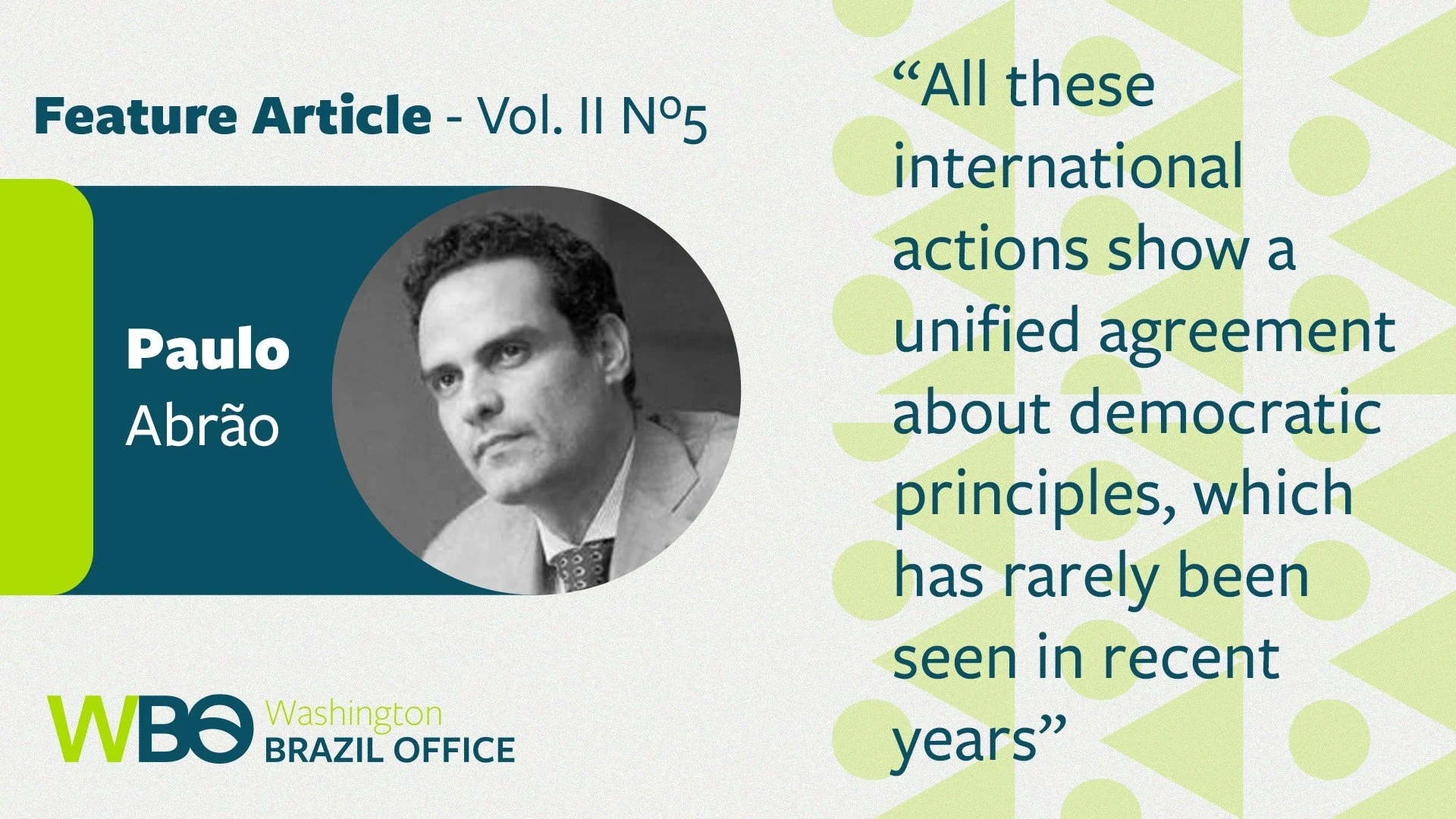The International Reaction to the Attempted Coup in Brazil
Paulo Abrão is executive director of the WBO (Washington Brazil Office). This article was written for Vol. #49 of the weekly newsletter that the organization edits and distributes every week, in English. To subscribe, enter your email in the form at the bottom of the text.
The frustrated attempt at a coup d'état in Brasília on January 8 was rejected with relative effectiveness by a wide range of democratic forces. These forces are primarily made up of national figures, who have had and must remain in contact with important international actors supporting democracy in Brazil.
As has rarely been seen, on the day after the invasions of the seats of the three branches of the Brazilian government, there was a significant convergence among the leaders of the executive, legislative and judiciary, in addition to the governors of the 26 states and the leaders of the association of mayors. In a coordinated, unified, and cohesive manner, the nation responded with force, through these institutions and their leaders, regardless of their partisan and political-ideological differences
President Lula played the role of a statesman by leading an important meeting on Monday, January 9, which was held in the presidential palace (Palácio do Planalto) in Brasília, a building that is still scarred by damage. Then, in a strong symbolic gesture, he went down the ramp of the presidential palace – the same one he had gone up on January 1 when he was inaugurated as president. This time he was accompanied by all the country’s senior authorities, who walked together to the headquarters of the Supreme Court, whose historic building had also been violently vandalized by Bolsonaro’s supporters the day before.
The unified reaction of these national leaders was a fundamental part of the response to this attempted coup d'état, which was coordinated and conducted within the country by key national figure, but it also had fundamental foreign support.
On the same day as the extremist attacks on the capital, leaders from around the world used their social networks, and then traditional diplomatic channels, to condemn the coup movement and reiterate their support for President Lula and Brazilian democracy. No government has questioned the legitimacy of Lula's election, nor has any head of state supported the extreme right movement that had recently attacked the three branches of power in Brazil. Not even exponents of this new populist extreme right, such as the Prime Minister of Italy Girogia Meloni, dared offer backing to Bolsonaro and his followers.
Then, on January 11, at least lawmakers representing two other international initiatives issued statements. First, a group of more than 60 Brazilian and US congressional representatives and senators signed a joint declaration warning of threats from an extreme right that operates in a coordinated manner in both countries. In addition, the binational group called for the accountability of those involved in these actions to destabilize democracy.
“To a large extent, the extensive network of international solidarity in favor of Brazilian democracy already existed, which allowed for a quick reaction in the face of extreme events”
That same day, another congressional group – this time, made up only of Americans – handed US President Joe Biden a letter asking for Bolsonaro’s US visa to be revoked. The group also requested that the former Brazilian president be investigated to determine whether he plotted against Brazilian democracy from US territory, after he traveled to Orlando, Florida on December 30, two days before Lula’s inauguration as president.
All these international actions show a unified agreement about democratic principles, which has rarely been seen in recent years. Even if not all these responses were coordinated from a single center, they reveal enormous coherence, even considering the natural nuances between the different actors and their respective government institutions.
The WBO played an influential role in some of these initiatives. The organization worked to bring together US and Brazilian congressional representatives to draft the joint declaration in which they warn of the risks that the extreme right in both countries poses to democracy. Then, the WBO participated in the articulation of the letter addressed to Biden, which requests an investigation into the role of the former Brazilian president in anti-democratic acts, in addition to demanding the revocation of his visa.
The WBO’s role in defending Brazilian democracy is not new. Six months ago, the organization took a group of representatives of 19 Brazilian civil society organizations to Washington to warn members of the State Department and US Congress about the risks that Bolsonaro posed to the electoral system and democracy as a whole.
To a large extent, the extensive network of international solidarity in favor of Brazilian democracy already existed, which allowed for a quick reaction in the face of extreme events. The invasion of the Brazilian Congress, the presidential palace and the Supreme Court located in Brasília in what is known as the Plaza of the Three Powers (Praça dos Três Poderes) could easily have led to an even more tragic outcome, such as the achievement of its main objective, which was to depose a legitimate government, to say nothing of the risk of injuries and deaths.
These recent events reinforce the importance of permanent and persistent work to connect not only lawmakers from both countries, but also civil society, which is at the forefront of protecting democratic rights. The WBO will continue in its role in linking key actors in both countries while expanding its position as a provider of expert knowledge about Brazil in this very important moment in the consolidation of Brazilian democracy.

